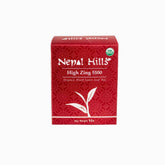Addressing Challenges Faced by the Nepali Tea Industry
The Nepali tea industry has a rich history and has unique geographical advantages, but has faced numerous challenges. First and probably the biggest one being the lack of certification and inability to catch up with modern production techniques. This has adversely affected its ability to increase the production of orthodox or organic tea.
Although most small farmers grow teas organically, there is a huge challenge to achieve organic certification. Unlike Darjeeling where bigger estates produce teas in higher volume, Nepali Tea industry is filled with small artisan producers, who are not able to afford certifying their teas due to high cost of certification. To give you an idea, it costs a artisan manufacturer somewhere between USD 7000 to $10,000 in the first year and up to 5-6000 dollars in the subsequent years to maintain the organic certification.
Another issue the industry has struggled is labor shortages. Large numbers of Nepali youth are immigrating to different countries around the world to work or to settle down. Tea production process is labor intensive and does not have huge rewards for the farmers. Additionally, there are other issues like lack of branding (compare Darjeeling Tea), failure to identify new markets to explore etc. Most farmers who work in this sector are small holder farmers and cannot take the benefit like the estate owners do.
An incident that recently happened and has impacted Nepali Tea Industry was in November of 2021 when India banned the import and blending of Nepali Teas. Although this move was aimed to protect India’s domestic industry specially Darjeeling branded teas, there was a huge impact on Tea Industry from Nepal as biggest chunk of these teas are exported to India.
The Syndicate of Big Estates
Another mentionable and painful fact is Nepali tea artisans are the victims of the syndicate created by big estates. These estates often with often large funding and huge political connection have monopolized the industry which prevents the exposure of small artisans to the international market. Thus cornered, small farmers and artisans have no other option than to sell their products to these big estates or to export them to India at a very cheap Price.
Discussing Historical Setbacks, Market Fluctuations, and Quality Issues
It would be stupid to compare the counterpart Indian Tea industry with Nepali Tea industry due to multiple fundamental facts like political history, governing policies, geographical differences etc., but Nepali Tea industry had its chance to grow along side Indian Tea Industry which was nipped in the bud due to inability of the political leadership to recognize the potential. Since the establishment of Democracy in Nepal, there have been too many political changes and not a single ruling party was able to come up with a long-term plan to elevate the status of Nepali tea Industry.
International market fluctuations and global political instability has also posed a major challenge. For example, a huge volume of commercial tea produced in Nepal was exported to Russia, which has now become difficult or even say impossible due to global political turmoil.
We cannot forget about the quality issues. Importing countries from European union have expressed concerns over pesticides residue in Tea from Nepal and India. While India Tea industry addresses these challenges by easily lab testing their teas, Nepali artisans have been thrown in a dark pit because of the lack of Laboratories in Nepal to check the products.
Proposing Strategies for Overcoming Obstacles and Revitalizing the Industry
To overcome these challenges and revitalize the industry, several strategies can be implemented:
- Invest in Modern Technology and Certification: It is crucial that Nepal government and even private sector should invest in modern production technologies and facilitate the lab testing and certification process to increase the production and certify the teas as “organic”.
- Improve Infrastructure and Facilities: It would be highly beneficial if there is investment on initiatives like central tea collection and tasting centers, where international buyers can come and try teas at a central location. This initiative has to be taken by the local governing body rather than private organizations.
- Promote Fair Trade Practices: This is also a responsibility of either central or local governing body. They have to ensure that fair trade practice is being upheld and smallholder farmers get a fair price for their green leaf and their living condition is improved over the course of time.
- Enhance Branding and Marketing: This initiative can be taken as a joint collaboration between the government and the private organizations where effective marketing strategies must be implemented to promote Nepali Tea domestically and internationally. This effort includes investing in branding all the Nepali teas and identifying new export markets. To promote tea consumption within the country, Nepal can also ban the import of CTC teas from neighboring countries.
- Lobby for Fair Trade Policies: Nepali government should lobby for fair trade policies with international counterparts so that a fair price is paid to Nepali Teas and situation like ban of Nepali Teas is averted in the future.
- Invest in Quality Control: Investment in quality control mechanisms such as establishment of laboratories for soil testing, chemical testing etc. can help meet international quality standards and boost export.
-
Coordinate with Nepali run enterprises abroad: Local municipal bodies can coordinate with Nepali run enterprises abroad. These entrepreneurs can facilitate programs which can develop programs for small tea business in those countries to buy teas directly from the producing artisan factories in Nepal. "Nepal Hills Tea Inc." runs such a program now, where buyers can buy products at a factory price.
By implementing these strategies, the Nepali tea industry can overcome its challenges and unlock its full potential.
FAQs
- What are the main challenges faced by the Nepali tea industry?
- The main challenges include the lack of certification and appropriate modern technology, high cost of organic farming, labor shortages, branding issues, and the failure to identify new export markets.
- What was the impact of India’s ban on the blending of Nepali teas?
- The ban had a significant impact on Nepal’s tea sector, which greatly depends on exports to India. It posed a significant challenge to the Nepali tea industry.
- What historical setbacks has the Nepali tea industry faced?
- The industry’s growth was mainly hindered due to political turmoil and resulting economic policies under different regimes . After the democratic movement of 1950, the floor was opened for investment in the industry. But there are no concreate government policies to support Nepali Tea Industry yet.
- What strategies can be implemented to overcome the obstacles in the Nepali tea industry?
- Strategies include investing in modern technology and certification, improving infrastructure and facilities, promoting fair trade practices, enhancing branding and marketing, lobbying for fair trade policies, and investing in quality control.
- How can consumers ensure they are supporting fair trade practices in the tea industry?
- Consumers can ensure they are supporting fair trade practices by researching and choosing companies that are transparent about their sourcing and production methods.





